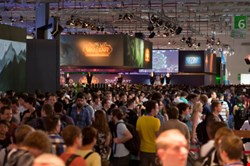
"We know that terrorists use many feature-rich Internet communications media for operational purposes such as email, VoIP, chat, proxies, and web forums and it is highly likely they will be making wide use of the many communications features offered by Games and Virtual Environments (GVE) by 2010," says one top secret 2007 NSA document obtained by the Guardian and shared with the New York Times and ProPublica. "The SIGINT Enterprise needs to begin taking action now to plan for collection, processing, presentation, and analysis of these communications."
It is clear that the spy agencies subsequently made significant effort to infiltrate the virtual worlds, both with characters within those worlds and by intercepting communications. A year later a separate document says, "Al-Qaida terrorist target selectors and … have been found associated with Xbox Live, Second Life, World of Warcraft, and other GVEs. Other targets include Chinese hackers, an Iranian nuclear scientist, Hizballah, and Hamas members."
What is not clear, however, is whether the agencies ever found proof that terrorists have used virtual worlds to plot and plan rather than simply play the game – although it is almost certain that 'terrorist organizations' (and indeed the intelligence agencies) have used the games for recruitment purposes. Nor is it clear how the NSA would be able to distinguish US citizens disguised as supermen, trolls and wizards (who it cannot monitor without court approval) from foreign supermen trolls and wizards. It is noticeable, however, that Menwith Hill, nominally an RAF base in the UK, but jointly operated by the NSA and GCHQ, figures strongly in the interceptions.
Nevertheless, there is at least some corroboration of the agencies' fears – but involving criminality rather than terrorism. Following the take down of a carding website, the criminals moved into Second Life in 2008. GCHQ followed, and with the help of an informer who volunteered information within the virtual world, were able to provide the London police with the information necessary to break up the gang.
There remain doubts, however, that online gaming is a suitable environment for serious criminals and terrorists. Peter Singer of the Brookings Institution explains that games "are built and operated by companies looking to make money, so the players’ identity and activity is tracked. For terror groups looking to keep their communications secret, there are far more effective and easier ways to do so than putting on a troll avatar."
For its part, Blizzard (the maker of World of Warcraft) denied any knowledge of NSA or GCHQ involvement. "We are unaware of any surveillance taking place," said a spokesman for Blizzard Entertainment. "If it was, it would have been done without our knowledge or permission." Microsoft and Linden Lab (maker of Second Life) declined to comment.